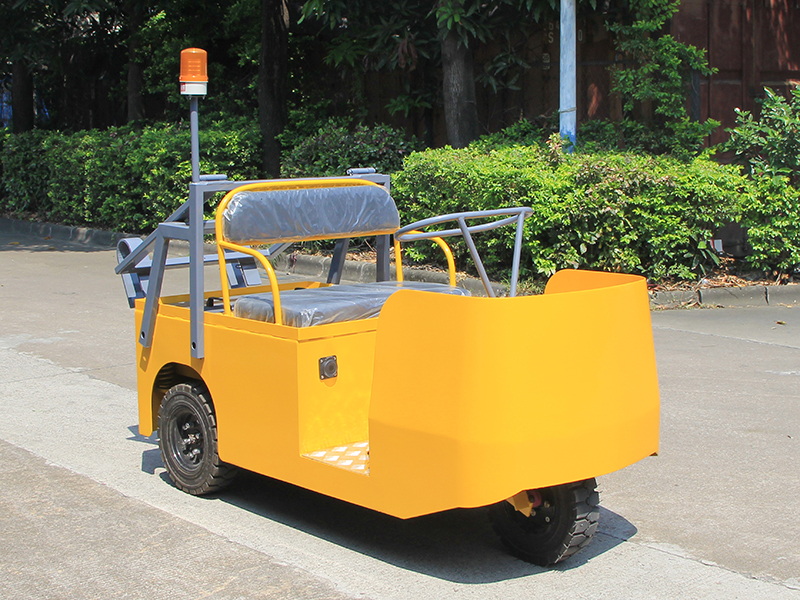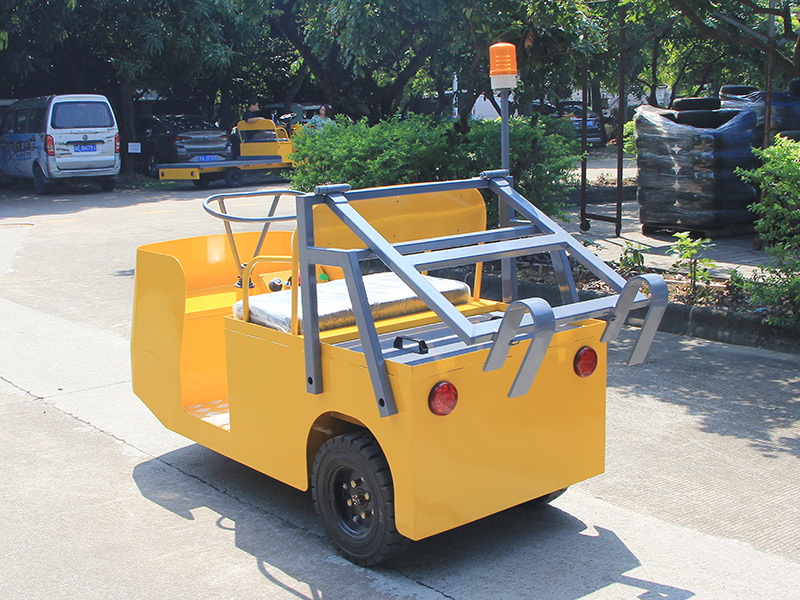Content Menu
● Introduction to Electric Towing Tractors
● Key Ways Electric Towing Tractors Boost Productivity
>> 1. Increased Operational Efficiency
>> 2. Reduced Labor Costs and Improved Safety
>> 3. Lower Operating and Maintenance Costs
>> 4. Environmental Sustainability
● Technological Advancements Driving Productivity
>> Lithium-Ion Battery Technology
>> Intelligent Control Systems
>> Autonomous and Connected Features
● Practical Applications in Industrial Settings
>> Warehousing and Distribution Centers
>> Manufacturing Plants
>> Airports and Logistics Hubs
● Additional Benefits of Electric Towing Tractors
>> Enhanced Worker Satisfaction and Retention
>> Scalability and Flexibility
>> Regulatory Compliance and Incentives
● Conclusion
● FAQ
>> 1. What are the main advantages of electric towing tractors over gas-powered ones?
>> 2. How do electric towing tractors reduce labor costs?
>> 3. What role does lithium-ion battery technology play in electric tow tractors?
>> 4. Can electric towing tractors operate autonomously?
>> 5. How do electric towing tractors contribute to sustainability goals?
Electric towing tractors are transforming industrial operations by enhancing productivity, reducing costs, and promoting sustainability. These innovative machines are increasingly replacing traditional fuel-powered tow tractors in warehouses, manufacturing plants, airports, and other industrial environments. This article explores how electric towing tractors improve productivity, the technological advancements behind them, and their broader benefits to businesses and the environment.

Introduction to Electric Towing Tractors
Tow tractors are specialized vehicles designed to tow heavy loads, such as trailers or carts, within industrial facilities. Electric towing tractors run on electric power, typically using lithium-ion batteries, which provide a clean and efficient alternative to internal combustion engines. Their ability to move heavy materials quickly and safely makes them indispensable in material handling operations.
The shift to electric towing tractors aligns with the global push for greener, more energy-efficient industrial processes. As companies face increasing pressure to reduce emissions and improve operational efficiency, electric towing tractors offer a compelling solution that addresses both priorities simultaneously.
Key Ways Electric Towing Tractors Boost Productivity
1. Increased Operational Efficiency
Electric towing tractors significantly enhance operational efficiency by streamlining material transport processes. Their powerful electric motors enable them to tow heavy loads swiftly across large facilities, reducing the time required for material delivery by up to 50% compared to forklifts or manual methods. This speed advantage is critical in high-volume environments where delays can cascade into costly production bottlenecks.
Moreover, electric towing tractors boast superior maneuverability. Their compact design and responsive steering systems allow them to navigate narrow aisles and tight spaces with ease. This capability optimizes workflow by enabling continuous movement without the need for extensive re-routing or waiting for clearance, thus maximizing throughput.
In addition, electric towing tractors can tow multiple trailers simultaneously, further multiplying the volume of materials moved per trip. This reduces the number of trips needed, saving time and energy, and allowing facilities to meet tight delivery schedules more reliably.
2. Reduced Labor Costs and Improved Safety
By automating or simplifying the towing process, electric tow tractors reduce the physical strain on workers and lower the risk of workplace injuries. Manual towing or the use of less specialized vehicles can expose workers to repetitive strain injuries, collisions, or other hazards. Electric towing tractors, especially those equipped with ergonomic operator cabins and intuitive controls, minimize these risks.
Automated electric tow tractors take this a step further by reducing or eliminating the need for human operators in certain tasks. This automation not only cuts labor costs but also improves consistency and precision in material handling. Operators who remain in control benefit from reduced fatigue due to smoother acceleration and braking, adjustable seating, and reduced noise levels.
Safety features such as electronic stability control, automatic braking, and obstacle detection systems are often integrated into electric towing tractors. These technologies help prevent accidents, protect personnel, and reduce downtime caused by incidents, all of which contribute to higher overall productivity.
3. Lower Operating and Maintenance Costs
Electric tow tractors have fewer moving parts than gas-powered models, leading to simpler maintenance and less downtime. Internal combustion engines require regular oil changes, fuel system maintenance, and exhaust system repairs, all of which add to operating expenses. In contrast, electric motors are more reliable and require less frequent servicing.
The elimination of fuel costs is another major advantage. Electricity is generally cheaper and more stable in price compared to diesel or gasoline. Facilities can take advantage of off-peak electricity rates to recharge batteries, further reducing energy expenses.
Advances in battery technology, especially lithium-ion batteries, extend run-time and reduce charging frequency, increasing uptime and operational continuity. Fast-charging capabilities allow electric towing tractors to be recharged during short breaks or shift changes, minimizing idle time.
Furthermore, electric towing tractors do not emit harmful exhaust gases, which reduces the need for costly ventilation and air filtration systems in enclosed industrial environments. This can translate into additional savings on facility infrastructure and energy consumption.
4. Environmental Sustainability
Electric towing tractors produce zero tailpipe emissions, helping industrial operations reduce their carbon footprint and comply with increasingly strict environmental regulations. This is particularly important in sectors where air quality standards are stringent, such as food processing or pharmaceuticals.
Their quiet operation also reduces noise pollution, creating a more pleasant and safer work environment. Lower noise levels contribute to reduced operator fatigue and improved communication among workers, which can enhance overall workplace productivity.
Adopting electric towing tractors supports corporate sustainability goals and enhances brand reputation. Many companies now report on environmental, social, and governance (ESG) metrics, and switching to electric vehicles is a tangible way to demonstrate commitment to sustainability.

Technological Advancements Driving Productivity
Lithium-Ion Battery Technology
The shift from traditional lead-acid batteries to lithium-ion batteries has been a game-changer. Lithium-ion batteries offer longer lifespans, faster charging times, and higher energy density, enabling electric tow tractors to operate longer with fewer interruptions. This technology reduces the total cost of ownership and improves reliability.
Lithium-ion batteries also require less maintenance than lead-acid batteries, which need regular watering and equalizing charges to maintain performance. Their lighter weight contributes to improved vehicle efficiency and handling.
Battery management systems (BMS) integrated into electric tow tractors monitor battery health in real-time, optimizing charging cycles and preventing overcharging or deep discharging. This extends battery life and ensures consistent performance.
Intelligent Control Systems
Modern electric towing tractors incorporate smart technologies such as electronic stability control, automatic braking, and ergonomic operator cabins to improve safety and efficiency. These systems help maintain vehicle stability when towing heavy or uneven loads, reducing the risk of accidents.
Integration with warehouse management systems (WMS) enables optimized routing and load handling, further enhancing productivity. Real-time data on tractor location, battery status, and load weight allows supervisors to allocate resources dynamically and avoid bottlenecks.
User-friendly interfaces and telematics systems provide operators with instant feedback on vehicle performance and maintenance needs, enabling proactive servicing and minimizing downtime.
Autonomous and Connected Features
Some electric tow tractors are equipped with autonomous capabilities and IoT connectivity, allowing for automated towing operations and real-time monitoring. This reduces human error and enables continuous operation, even during off-hours, maximizing asset utilization.
Autonomous electric tow tractors use sensors, cameras, and AI algorithms to navigate complex environments safely. They can follow predefined routes, adjust speeds based on traffic conditions, and avoid obstacles without human intervention.
Connected features allow fleet managers to monitor vehicle health, track usage patterns, and schedule maintenance remotely. This data-driven approach improves fleet management efficiency and extends the service life of equipment.
Practical Applications in Industrial Settings
Warehousing and Distribution Centers
Electric towing tractors are widely used to transport goods between storage areas and shipping docks. Their ability to handle multiple trailers at once and operate continuously makes them ideal for high-volume environments.
In distribution centers, speed and reliability are critical to meeting customer expectations. Electric tow tractors help reduce order fulfillment times by ensuring that goods are moved quickly and accurately from receiving to shipping.
Their zero-emission operation is especially beneficial in indoor warehouses, where air quality is a concern. Facilities can maintain a healthier environment for workers without compromising productivity.
Manufacturing Plants
In manufacturing, these tractors facilitate just-in-time delivery of components to assembly lines, reducing production delays and increasing throughput.
Electric towing tractors can be integrated into lean manufacturing processes, enabling smooth flow of materials and minimizing inventory buildup. Their precise control allows for synchronized delivery schedules, supporting complex production workflows.
The quiet operation of electric tow tractors also contributes to a less distracting work environment, which can enhance worker concentration and reduce errors on the assembly line.
Airports and Logistics Hubs
Electric tow tractors efficiently move luggage carts and cargo trailers, supporting fast turnaround times and reducing emissions in sensitive areas.
Airports benefit from the reduced noise and emissions of electric towing tractors, which improve passenger comfort and comply with environmental regulations. Their reliability ensures that baggage and cargo are transported promptly, minimizing delays.
In logistics hubs, electric towing tractors help manage the high volume of freight movement with agility and precision. Their ability to operate autonomously or semi-autonomously can further boost throughput during peak periods.
Additional Benefits of Electric Towing Tractors
Enhanced Worker Satisfaction and Retention
Electric towing tractors contribute to a better workplace environment by reducing noise, vibration, and exposure to pollutants. Operators experience less fatigue due to ergonomic designs and smoother vehicle operation. This can lead to higher job satisfaction, lower turnover rates, and improved overall morale.
Scalability and Flexibility
Electric towing tractors come in various sizes and power ratings, making them adaptable to different industrial needs. Facilities can scale their fleet according to demand, adding more tractors during peak seasons or downsizing during slower periods without significant capital expenditure.
The modular design of many electric tow tractors allows for easy upgrades and customization, such as adding specialized attachments or integrating new technologies, ensuring long-term usability.
Regulatory Compliance and Incentives
Many governments offer incentives for adopting electric vehicles, including tax credits, rebates, and grants. Using electric towing tractors can help companies qualify for these benefits, reducing upfront costs.
Additionally, electric towing tractors help organizations comply with occupational health and safety regulations by minimizing exposure to hazardous emissions and reducing noise levels.
Conclusion
Electric towing tractors represent a significant advancement in industrial material handling. By combining powerful electric propulsion, smart technology, and sustainable design, they improve productivity, reduce operational costs, and support environmental goals. Their ability to increase operational efficiency, reduce labor and maintenance costs, and enhance workplace safety makes them a valuable asset across various industrial sectors.
As industries continue to prioritize efficiency and sustainability, electric towing tractors will play an increasingly vital role in shaping the future of industrial logistics. Investing in these vehicles not only boosts productivity but also positions companies as leaders in innovation and environmental stewardship.

FAQ
1. What are the main advantages of electric towing tractors over gas-powered ones?
Electric towing tractors offer zero emissions, lower operating and maintenance costs, quieter operation, instant torque for smooth acceleration, and enhanced safety features, making them more efficient and environmentally friendly than gas-powered models.
2. How do electric towing tractors reduce labor costs?
They streamline material transport by enabling faster and easier towing of heavy loads, reducing the need for manual handling and allowing for automation, which lowers labor requirements and associated costs.
3. What role does lithium-ion battery technology play in electric tow tractors?
Lithium-ion batteries provide longer run times, faster charging, and extended lifespan compared to traditional batteries, increasing uptime and reducing the frequency of battery replacements, which improves cost-effectiveness and productivity.
4. Can electric towing tractors operate autonomously?
Yes, some models incorporate AI, robotics, and IoT technologies to enable autonomous operation, improving efficiency by allowing continuous and precise material handling without human intervention.
5. How do electric towing tractors contribute to sustainability goals?
They produce zero tailpipe emissions, reduce noise pollution, and lower the overall carbon footprint of industrial operations, helping companies meet environmental regulations and corporate social responsibility targets.










































